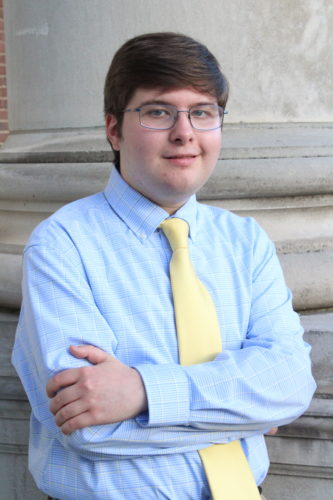Birmingham Mayor Randall Woodfin and journalist Jeff Johnson discussed solving America’s political divide at Samford University on Thursday, Jan. 31, 2019.
According to Woodfin, America’s toxic political atmosphere prevents issues from being addressed.
“Our community conversations drip with divinesses. Our social media feeds are flooded with attacks from faceless trolls.”
From Woodfin’s perspective, this divide has been intensified by the U.S.’s leadership. America’s elected representatives help shape the national conversation and the most extreme positions have dominated in order to win elections.
“Our elected leaders are handcuffed by partisanships and play to their close-minded bases instead of stepping outside of their silos and opening up dialogue,” he said. “Even the highest office in the land would rather erect walls rather than build bridges.”
In order to find common ground and create policy, Woodfin argued politician’s priorities need to change.
“I think you need to have elected officials who aren’t afraid to lose an election. The reason you are there in that position is to represent the people … but more importantly deliver a better quality of life for them,” he said.
Rather than waiting for progress in Washington D.C., Woodfin suggested Birmingham should also help bridge this divide because the city faced similar adversities during the Civil Rights Movement.
“This city was the blueprint for social justice. As our world faces a whole new set of challenges rooted in the same old division and hatred, one thing is for sure, the world needs Birmingham right now and once again where we can teach the world … the lessons of equality,” Woodfin said.
Johnson agreed with Woodfin that the U.S.’s leadership has impacted America’s divide. Frustrated with the nation’s polarized politics, many Americans are now challenging this power structure by voting out incumbent representatives.
“We are seeing a shift in political leadership at various levels, whether it’s municipal, county, state-wide, or even in Washington D.C. I think it is a encouraging sign in one perspective and a scary sign in another,” Johnson said.
Many incumbents are being replaced by younger representatives. According to Johnson, Congress’s incoming freshman class is one of the youngest in history.
“That’s troubling for me because there’s this myth that all young leadership is a good shift but it’s not anymore than the myth that established leadership is good.”
Johnson fears some will prioritize fame and media attention over helping their constituents.
“There are some who want to be elected celebrities and they are more concerned about how many times they can be on MSNBC, CNN, Fox News, or a news website rather than transforming the lives of the people that elected them to office,” he said.
However, many of the these young representatives are also passionate and bring skills from different industries that career politicians lack. These skills help solve the world’s ever-changing problems more effectively.
“This is a wave of young leaders that have committed themselves to mastery and excellence..bringing that skill set to a place of public service adds value to whatever office they are running for,” Johnson said.
Ultimately, Johnson argued younger and older leaders should work together to create progress. Younger leader’s strength and passion helps them challenge the power structure and prevents complacency. Older leaders can offer guidance.
“You need a militante young people to scare the power structure so they would be willing to negotiate with senior statesmen and women. It’s about the strength of the young paired with the wisdom of elders which ensures movement and change,” he said. “I want to see young people who embrace effective tradition but push toward progressive methodology.”
On the individual level, technology is fueling America’s divide and preventing communities from discussing difficult issues because it traps people in echo chambers. Johnson argues tweets and posts strip context because they lack body language and people’s voices.
“Social media is not a place to have a conversation. Social media is a place to share ideas,” he said. “The difficult conversations have to take place face to face because we cannot continue to allow technology to be a tool that allows us not to confront our fears,”Johnson said.
Without these conversations, Johnson said it will impair the way future generations tackle problems.
“Why do we expect our children to be prepared to have courageous conversations when they haven’t watched us do it.”

William is our News Editor. He is a Journalism & Mass Communications major from Birmingham, Alabama.





